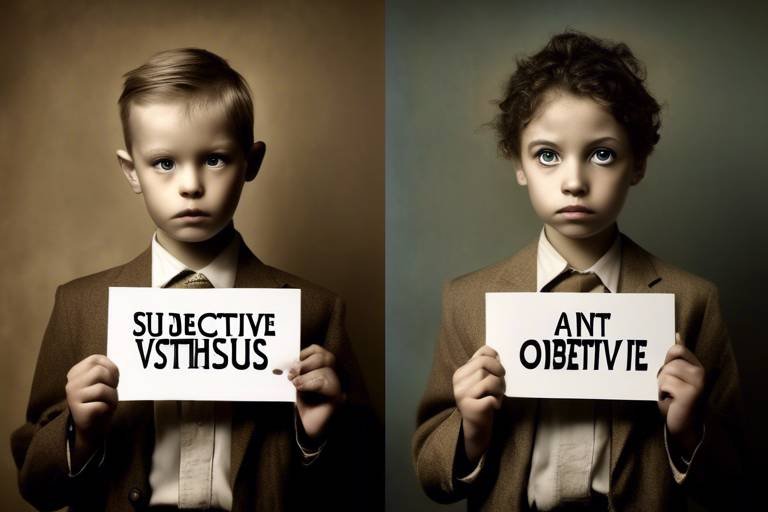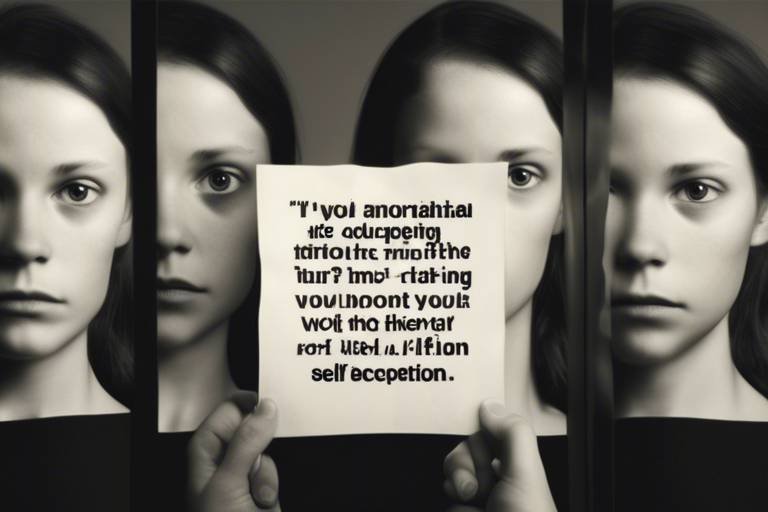The Morality of Subjective Vs Objective Ethics
The debate between subjective and objective ethics has long been a cornerstone of moral philosophy, inviting fierce discussions among scholars, philosophers, and everyday individuals alike. At its core, this debate challenges us to consider what morality truly means and whether it is something that is shaped by our personal experiences or if it exists as an independent entity, waiting to be discovered. Imagine standing at a crossroads, with one path leading to a world where moral truths are fluid, shaped by individual opinions and feelings, while the other path leads to a realm where these truths are fixed and universal. Which path would you choose? This article aims to unpack this complex dichotomy, examining the nuances of each perspective while exploring their implications in real-world scenarios.
Subjective ethics is the philosophical viewpoint that moral judgments are deeply rooted in personal feelings, opinions, and cultural contexts. This perspective suggests that what is "right" or "wrong" can vary significantly from person to person, shaped by their unique experiences and emotional responses. Have you ever found yourself in a moral dilemma, where your gut feeling clashed with societal norms? That’s subjective ethics in action! It emphasizes the importance of individual perspectives, making it a vibrant and often contentious aspect of moral philosophy. Think of it as a colorful tapestry, where each thread represents a different person's beliefs and feelings, creating a rich yet chaotic picture of morality.
On the flip side, we have objective ethics, which posits that moral truths exist independently of human beliefs and emotions. This means that certain actions are inherently right or wrong, regardless of individual perspectives. Imagine a set of laws written in the stars—unchanging and universal, guiding human behavior across cultures and time periods. Objective ethics aims to uncover these universal moral truths, offering a framework that can be applied consistently. It challenges us to look beyond our personal feelings and consider a broader moral landscape, one that could potentially unite diverse cultures under shared ethical standards.
The evolution of subjective ethics can be traced through various philosophical movements, each contributing to our understanding of morality as a personal construct. From the ancient Greeks to modern existentialists, thinkers have grappled with the implications of subjective moral beliefs. The rise of individualism during the Enlightenment further propelled this idea, leading to a greater emphasis on personal autonomy in moral decision-making. As we explore this historical context, we uncover a rich tapestry of thought that has shaped contemporary views on morality.
Notable philosophers like David Hume and Friedrich Nietzsche have played pivotal roles in shaping the landscape of subjective ethics. Hume, for instance, argued that our moral judgments stem from emotional responses rather than rational thought, suggesting that morality is a product of human sentiment. Nietzsche, on the other hand, challenged conventional morality, advocating for a more individualistic approach to ethics. Their contributions have sparked ongoing debates about the nature of morality, influencing contemporary thought and encouraging us to question the validity of our ethical beliefs.
However, subjective ethics is not without its critics. Many argue that its relativistic nature can lead to moral chaos, where any action can be justified based on personal feelings. This raises an important question: if everyone has their own moral compass, how can we establish universal standards? Critics contend that this perspective undermines the possibility of a shared ethical framework, making it difficult to navigate moral dilemmas in a diverse society. As we delve deeper into these critiques, we begin to understand the challenges that subjective ethics presents in our quest for moral clarity.
Objective ethics, too, has a rich philosophical history. From ancient philosophers like Plato, who posited the existence of ideal forms, to modern ethicists who advocate for universal moral truths, the quest for an objective moral framework has been a driving force in ethical discourse. This section reviews significant developments and the thinkers who championed the idea of universal moral truths, providing a backdrop for understanding the implications of objective ethics in contemporary society.
When we compare subjective and objective ethics, it becomes clear that each has its strengths and weaknesses. Subjective ethics allows for personal expression and adaptability, making it relevant in diverse cultural contexts. However, it risks descending into moral relativism, where anything goes. Conversely, objective ethics provides a stable framework for moral decision-making but may overlook the nuances of individual experiences. Understanding these differences is crucial for navigating moral dilemmas effectively, as it encourages us to balance personal beliefs with universal principles.
Subjective ethics significantly influences personal decision-making and societal norms. Our individual moral beliefs shape our actions and contribute to the community standards we uphold. For instance, in a diverse society, differing moral perspectives can lead to vibrant discussions but also to conflicts. How do we reconcile these differences? This section explores the dynamic interplay between personal ethics and collective norms, highlighting the importance of dialogue in fostering understanding.
On the other hand, objective ethics impacts legal systems and societal structures. Laws and ethical guidelines often stem from the belief in universal moral truths, governing behavior across communities. This section discusses how objective ethics serves as a foundation for establishing laws that aim to protect individuals and uphold justice. However, the challenge remains: how do we ensure that these laws reflect the diverse values of a multicultural society?
- What is the main difference between subjective and objective ethics? Subjective ethics is based on personal feelings and opinions, while objective ethics asserts that moral truths exist independently of individual beliefs.
- Can subjective ethics lead to moral chaos? Yes, critics argue that subjective ethics can result in moral relativism, where any action can be justified based on personal feelings.
- How do philosophers influence our understanding of ethics? Philosophers like David Hume and Friedrich Nietzsche have shaped contemporary views on morality, challenging us to consider the foundations of our ethical beliefs.

Defining Subjective Ethics
When we dive into the realm of subjective ethics, we're stepping into a world where moral judgments are not just cold, hard facts but are instead colored by personal feelings, experiences, and opinions. Imagine a vibrant painting where every stroke is influenced by the artist's emotions; that’s how subjective ethics operates in the moral landscape. It asserts that what is considered right or wrong varies from person to person, shaped by individual perspectives and cultural contexts. This viewpoint emphasizes that morality is not a universal constant but rather a fluid concept that can shift depending on who is observing it.
At its core, subjective ethics suggests that there are no absolute moral truths. Instead, moral judgments are deeply intertwined with our personal beliefs and societal norms. For instance, one person might believe that honesty is the best policy based on their upbringing, while another may argue that sometimes, a little white lie can protect someone's feelings. This divergence illustrates how subjective ethics allows for a multitude of moral viewpoints, each valid in its own right. It’s like a buffet of morals where everyone picks what resonates with their taste.
Philosophically, subjective ethics can be traced back to the works of influential thinkers like David Hume and Friedrich Nietzsche, who argued that our moral judgments are rooted in our emotions and cultural conditioning. Hume famously stated that reason is the slave of the passions, suggesting that our feelings drive our ethical decisions rather than rational thought. This perspective opens up a fascinating dialogue about how emotions and experiences shape our understanding of morality. It raises questions such as: Can we ever truly separate our feelings from our ethical beliefs? and How do our backgrounds influence our moral compass?
However, this emphasis on personal perspective does not come without its challenges. Critics of subjective ethics often point to its potential for relativism, where one person's morality can conflict with another's, leading to a chaotic moral landscape. If everyone is entitled to their own moral beliefs, how do we establish common ground? This is where the debate intensifies, as subjective ethics can sometimes lead to moral ambiguity. For instance, consider a scenario where one culture practices a form of punishment that another culture finds abhorrent. How do we reconcile these conflicting views? The subjective approach can make it difficult to find a universally accepted moral framework.
In summary, subjective ethics invites us to explore the rich tapestry of human experience and emotion in moral decision-making. It challenges us to recognize the validity of diverse perspectives while also prompting us to consider the implications of a world where moral truths are not fixed. As we move forward in our exploration of ethics, understanding subjective ethics is crucial for navigating the complexities of moral philosophy and decision-making.

Defining Objective Ethics
Objective ethics is a fascinating realm within moral philosophy that proposes the existence of universal moral truths, independent of human opinions or beliefs. Imagine a set of ethical standards that apply to everyone, regardless of culture, personal preference, or societal norms. This concept asserts that certain actions are inherently right or wrong, no matter the circumstances. The idea is that morality is not merely a social construct but rather a fundamental aspect of our existence, much like the laws of physics that govern the universe.
At the heart of objective ethics lies the belief that there are moral facts that can be discovered through reason and critical thinking. Think of it as navigating through a dense forest with a compass; while different paths may lead to various destinations, the compass points towards a true north that remains constant. This notion of a fixed moral compass is what draws many to objective ethics, as it promises clarity in a world often muddied by subjective interpretations of right and wrong.
Philosophers who advocate for objective ethics argue that moral principles, such as justice, equality, and respect for human rights, are not merely opinions but are instead grounded in rationality and can be universally applied. For instance, the idea that murder is wrong is not just a societal agreement; it is presented as an objective truth that transcends cultural differences. This perspective can be incredibly appealing, especially in a globalized world where diverse moral frameworks often clash.
However, defining objective ethics is not without its challenges. Critics argue that if moral truths exist independently of human beliefs, how do we account for the vast differences in moral practices across cultures? This leads to a rich discussion about the implications of cultural relativism versus moral absolutism. To illustrate this debate, consider the following table:
| Aspect | Subjective Ethics | Objective Ethics |
|---|---|---|
| Basis of Morality | Personal feelings and opinions | Universal moral truths |
| Flexibility | Highly adaptable | Rigid and absolute |
| Application | Cultural and individual | Global and universal |
| Criticism | Relativism | Imposition of moral standards |
In summary, objective ethics presents a compelling framework for understanding morality as a set of principles that are universally applicable. This perspective encourages us to seek out moral truths that can guide our actions and decisions, fostering a sense of shared responsibility in our interconnected world. As we delve deeper into the nuances of ethical philosophy, it becomes clear that the dialogue between subjective and objective ethics is not merely academic; it has profound implications for how we live our lives and interact with others.

Historical Context of Subjective Ethics
The evolution of subjective ethics is a fascinating journey through the annals of philosophical thought. It traces back to ancient times when thinkers began to question the nature of morality and whether it was an absolute truth or merely a reflection of personal beliefs and societal norms. The idea that morality could be subjective—shaped by individual experiences, feelings, and cultural backgrounds—gained traction during the Enlightenment period, a time characterized by a surge in human reason and skepticism towards traditional authority.
One of the pivotal moments in this evolution occurred with the works of philosophers like David Hume. Hume argued that moral judgments stem from human emotions rather than rational deductions. He famously stated, "Reason is, and ought only to be the slave of the passions." This radical perspective suggested that our moral compass is not a product of logical reasoning but rather influenced by our feelings and sentiments. Hume’s ideas laid the groundwork for later thinkers who would further explore the implications of subjective morality.
Another significant contributor to the discourse of subjective ethics was Friedrich Nietzsche. Nietzsche challenged the prevailing moral standards of his time, proclaiming that traditional morals were constructed by societal conventions rather than inherent truths. He introduced the concept of the "will to power," suggesting that individuals create their own values in a world devoid of absolute moral truths. This idea resonates with the core of subjective ethics, emphasizing the role of individual perspective in defining what is right or wrong.
Throughout history, subjective ethics has been shaped by various cultural and intellectual movements. The rise of existentialism in the 20th century, for example, further emphasized the importance of individual choice and personal responsibility in moral decision-making. Thinkers like Jean-Paul Sartre posited that humans are condemned to be free, meaning that they must create their own essence through choices, which directly ties into the subjective nature of ethics.
However, the journey of subjective ethics is not without its challenges. Critics argue that if morality is entirely subjective, it leads to a slippery slope of relativism, where any action can be justified based on personal belief. This concern raises questions about the viability of establishing a cohesive moral framework in societies where individuals hold vastly different beliefs. Despite these critiques, the historical context of subjective ethics highlights its significance in understanding the complexities of human morality and the diverse perspectives that shape our ethical landscape.
- What is subjective ethics? Subjective ethics is the view that moral judgments are based on personal feelings and opinions rather than universal truths.
- Who are some key philosophers associated with subjective ethics? Notable philosophers include David Hume and Friedrich Nietzsche, who contributed significantly to the development of this moral perspective.
- What are the criticisms of subjective ethics? Critics argue that subjective ethics can lead to moral relativism, making it difficult to establish universal moral standards.
- How does subjective ethics influence decision-making? Subjective ethics impacts personal decision-making by emphasizing individual beliefs and feelings in determining what is right or wrong.

Key Philosophers of Subjective Ethics
When we dive into the world of subjective ethics, we encounter some fascinating thinkers who have shaped our understanding of morality. One of the most significant figures in this realm is David Hume. Hume, an 18th-century Scottish philosopher, argued that our moral judgments stem from our emotions rather than rational thought. He famously stated that reason is the slave of the passions, suggesting that our feelings play a central role in how we perceive right and wrong. This perspective challenges the notion that ethics can be universally defined, emphasizing the importance of personal experience and emotion in moral decision-making.
Another towering figure in subjective ethics is Friedrich Nietzsche. Nietzsche's philosophy is often associated with the idea of the "will to power," which posits that individuals create their own values and meanings in life. He rejected traditional moral systems, advocating for a more personal approach to ethics. Nietzsche believed that morality is not a fixed set of rules but rather a fluid construct shaped by individual perspectives and cultural contexts. This radical view encourages people to question societal norms and to forge their own paths in moral reasoning.
In addition to Hume and Nietzsche, other philosophers have contributed to the discourse on subjective ethics. For instance, Jean-Paul Sartre, a prominent existentialist, argued that existence precedes essence, meaning that individuals are free to define their own values and ethics through their choices. Sartre's ideas resonate with the subjective ethics perspective, as they highlight the significance of personal responsibility and the subjective nature of moral truths.
Moreover, Simone de Beauvoir, another existentialist, emphasized the importance of personal freedom and the ethical implications of our choices in her work. She argued that individuals must take responsibility for their actions, which inherently involves navigating the complexities of subjective morality. Her insights into the intersection of ethics and feminism further enrich the dialogue on how personal experiences shape our moral compass.
The contributions of these philosophers illustrate the rich tapestry of thought surrounding subjective ethics. They challenge us to consider how our individual experiences, emotions, and cultural contexts influence our moral beliefs. While subjective ethics may face criticism for its potential relativism, it undeniably highlights the diversity of human experience and the complexity of moral reasoning.
- What is subjective ethics? Subjective ethics posits that moral judgments are based on personal feelings and opinions, emphasizing individual perspectives in moral beliefs.
- Who are the key philosophers associated with subjective ethics? Key philosophers include David Hume, Friedrich Nietzsche, Jean-Paul Sartre, and Simone de Beauvoir, each contributing unique insights into the nature of morality.
- What are the criticisms of subjective ethics? Critics argue that subjective ethics can lead to moral relativism, making it challenging to establish universal moral standards.
- How does subjective ethics impact decision-making? Subjective ethics influences personal choices and societal norms, as individual moral beliefs shape actions and community standards.

Critiques of Subjective Ethics
While subjective ethics offers a compelling perspective on morality, it is not without its critics. One of the primary critiques is its inherent relativism. Critics argue that if moral judgments are solely based on personal feelings and opinions, then any action can be justified if someone believes it to be right. This leads to a slippery slope where heinous acts could be excused simply because an individual feels justified in their actions. Imagine a world where every person acts based on their subjective moral compass—chaos would likely ensue, as there would be no common ground for resolving conflicts.
Moreover, subjective ethics raises questions about accountability. If morality is entirely subjective, how can we hold individuals accountable for their actions? For instance, consider a scenario where one person believes stealing is acceptable while another sees it as morally wrong. Without an objective standard, the question of who is right becomes a matter of personal opinion rather than a matter of justice. This could create a society where moral absolutes are non-existent, leading to a breakdown of social order.
Another critique focuses on the lack of universality in subjective ethics. If everyone has their own moral beliefs, then establishing universal human rights becomes a daunting challenge. How can we advocate for justice and equality if we accept that moral truths vary from person to person? This leads to the argument that subjective ethics can undermine the very foundations of human rights, which rely on a shared understanding of morality.
Furthermore, subjective ethics can lead to moral inconsistency. Individuals may change their moral beliefs based on their circumstances or emotions, which can result in contradictory actions. For example, a person might advocate for environmental conservation one day and justify pollution the next, depending on their current interests or feelings. Such inconsistency can erode trust within communities, as people may become skeptical of each other's moral commitments.
In summary, while subjective ethics emphasizes personal experience and emotional engagement in moral decision-making, it faces significant challenges that question its viability as a comprehensive ethical framework. The critiques highlight the potential for moral chaos, accountability issues, the undermining of universal rights, and the risk of inconsistency. These challenges prompt us to reflect on the importance of integrating both subjective and objective elements in our understanding of morality, ensuring that we can navigate the complex landscape of ethical dilemmas effectively.

Historical Context of Objective Ethics
The concept of objective ethics has a rich and varied history that stretches back to ancient philosophical traditions. At its core, objective ethics asserts that certain moral truths exist independently of individual beliefs or cultural norms. This idea can be traced back to the works of early philosophers such as Socrates and Plato, who posited that moral knowledge could be attained through reason and dialogue. For Socrates, virtue was synonymous with knowledge, suggesting that understanding the good was essential for moral action.
As we move through history, we encounter the Stoics, who contributed significantly to the development of objective moral thought. They argued that living in accordance with nature and reason was paramount, promoting the idea that certain ethical principles were universally applicable. This notion of a shared human rationality laid the groundwork for later thinkers who would further explore the implications of objective ethics.
In the Enlightenment period, philosophers like Immanuel Kant emerged, advocating for a moral framework based on reason and the inherent dignity of individuals. Kant's categorical imperative proposed that one should act only according to maxims that could be universalized, effectively establishing a foundation for objective moral standards. His work emphasized that ethical principles should apply to all rational beings, regardless of personal preferences or societal norms.
Fast forward to the 19th century, and we see the rise of utilitarianism, championed by thinkers like John Stuart Mill and Jeremy Bentham. While utilitarianism introduces a consequentialist perspective, it still operates under the assumption that certain outcomes can be deemed objectively better based on their ability to promote happiness and reduce suffering. This idea of measuring ethical actions by their consequences adds another layer to the ongoing debate about objective ethics.
In more recent times, philosophers such as John Rawls have contributed to the discourse on objective ethics by introducing concepts like the veil of ignorance and the original position. Rawls argued for principles of justice that would be agreed upon by rational individuals under conditions that ensure fairness. This approach seeks to establish ethical standards that transcend individual biases and cultural differences.
Ultimately, the historical context of objective ethics reveals a complex tapestry of ideas and arguments that have evolved over centuries. From ancient philosophers to modern theorists, the quest for universal moral truths continues to challenge and inspire thinkers today. Understanding this historical backdrop is crucial for engaging with the ongoing debates about morality and ethics in our contemporary world.
- What is the main difference between subjective and objective ethics?
Subjective ethics is based on personal beliefs and feelings, while objective ethics posits that moral truths exist independently of individual opinions. - Can objective ethics be applied in real-life situations?
Yes, objective ethics can guide legal systems and societal norms, providing a framework for consistent moral decision-making. - Who are some key philosophers associated with objective ethics?
Key figures include Immanuel Kant, John Stuart Mill, and John Rawls, each contributing unique perspectives to the discourse.

Comparative Analysis of Both Ethics
When diving into the complex waters of ethics, it's fascinating to see how subjective and objective ethics stand in stark contrast yet also share some common ground. On one hand, subjective ethics thrives on the idea that moral judgments are deeply personal, shaped by individual experiences, feelings, and cultural backgrounds. Think of it like a colorful palette of opinions where every brushstroke represents a unique perspective. This means that what might be considered right for one person could be seen as wrong by another, leading to a rich tapestry of moral beliefs that can vary significantly from one community to another.
On the flip side, objective ethics presents a more rigid framework, asserting that certain moral truths exist independently of human feelings. Imagine it as a solid rock, unyielding and consistent, providing a foundation upon which societies can build their laws and ethical standards. Proponents of objective ethics argue that there are universal principles that apply to everyone, regardless of personal beliefs. This can create a sense of stability in moral decision-making, as individuals can rely on established ethical guidelines rather than navigating their subjective interpretations.
However, the debate doesn't end there. Each ethical perspective has its strengths and weaknesses. For instance, subjective ethics allows for flexibility and adaptability, making room for cultural diversity and personal growth. It acknowledges that morality is not one-size-fits-all, which can lead to a more inclusive society. Yet, this very flexibility can also result in moral relativism, where the absence of universal standards can lead to ethical chaos. How do we determine right from wrong if everyone has their own version of morality? This question often haunts discussions around subjective ethics.
Conversely, while objective ethics offers clarity and consistency, it can sometimes be perceived as overly rigid or disconnected from the complexities of human experience. Critics argue that strict adherence to universal moral principles might overlook important contextual factors that shape individual circumstances. For example, consider a situation where a law is in place that conflicts with an individual's moral beliefs. Objective ethics may demand adherence to the law, but subjective ethics might allow for personal interpretation and dissent. This clash can lead to moral dilemmas that challenge our understanding of justice and fairness.
To further illustrate the differences, let's take a look at a comparative table:
| Aspect | Subjective Ethics | Objective Ethics |
|---|---|---|
| Definition | Morality based on personal feelings and opinions | Morality exists independently of human beliefs |
| Flexibility | Highly flexible, allowing for diverse perspectives | Less flexible, adhering to universal principles |
| Examples | Cultural practices, individual beliefs | Legal systems, human rights |
| Criticism | Leads to moral relativism | Can be overly rigid |
In conclusion, the comparative analysis of subjective and objective ethics reveals a rich landscape of moral thought. Each perspective offers valuable insights into how we navigate ethical dilemmas in our lives. Whether we lean towards the personal touch of subjective ethics or the steadfast nature of objective ethics, understanding these frameworks can enhance our moral reasoning and decision-making processes.
As we continue to explore the nuances of ethics, it's essential to remember that the world is not black and white. Instead, it’s filled with shades of gray where our beliefs, experiences, and values intertwine to shape our understanding of right and wrong.
- What is the main difference between subjective and objective ethics?
Subjective ethics is based on personal feelings and opinions, while objective ethics posits that moral truths exist independently of human beliefs. - Can subjective ethics lead to moral chaos?
Yes, because it allows for diverse interpretations of morality, which can sometimes conflict with one another. - Are there any universal moral truths?
Proponents of objective ethics argue that there are universal moral truths that apply to all, regardless of individual beliefs. - How do these ethical perspectives impact decision-making?
Subjective ethics encourages personal reflection and cultural understanding, while objective ethics provides clear guidelines and standards for behavior.

Real-World Implications of Subjective Ethics
When we talk about subjective ethics, we're diving into a realm where personal feelings and opinions reign supreme. Imagine a world where everyone sees morality through their unique lens—it's a bit like looking at a painting from different angles. Each viewer might interpret the colors and shapes differently, leading to a rich tapestry of moral beliefs. This diversity can lead to vibrant discussions and a deeper understanding of human experience, but it also has its pitfalls.
In everyday life, subjective ethics profoundly influences our decision-making processes. For instance, consider a scenario where a person must decide whether to donate to a charity. Their choice could be driven by personal experiences, cultural background, or even emotional responses to a cause. Someone who has faced homelessness may feel a strong obligation to support shelters, while another person might prioritize environmental causes based on their passion for nature. This personal connection to ethics fosters a sense of individuality and authenticity in moral choices.
However, this emphasis on personal perspective can lead to significant challenges. When everyone operates under their own ethical framework, how do we establish common ground? In a society where moral beliefs vary widely, conflicts can arise. For example, in debates about issues like abortion or euthanasia, subjective ethics can create a battleground of opinions, each claiming legitimacy based on personal beliefs. This can make it difficult to reach consensus or develop universal laws that apply to everyone.
Moreover, subjective ethics can shape societal norms and expectations. As individuals share their moral viewpoints, these perspectives can influence community standards. For instance, social media platforms often amplify personal stories and opinions, leading to movements that challenge established norms. Think about the #MeToo movement; it emerged from personal experiences of individuals who shared their stories, sparking a global conversation about consent and accountability. This illustrates how subjective ethics can mobilize communities and inspire change.
Yet, while subjective ethics empowers individuals, it also raises questions about accountability. If moral judgments are entirely based on personal feelings, can we hold individuals accountable for their actions? This dilemma becomes particularly evident in legal contexts, where laws often rely on more objective standards. For instance, if someone justifies harmful behavior by claiming it aligns with their personal ethics, how do we navigate justice? This tension between personal morality and societal laws showcases the complexities of subjective ethics in real-world applications.
In conclusion, the implications of subjective ethics are both profound and multifaceted. They encourage personal expression and foster community engagement, but they also challenge our ability to find common ground in an increasingly polarized world. As we navigate our moral landscapes, it's essential to recognize the power of individual perspectives while also seeking ways to bridge the gaps that divide us.
- What is the main difference between subjective and objective ethics? Subjective ethics is based on personal feelings and opinions, while objective ethics asserts that moral truths exist independently of human beliefs.
- How does subjective ethics influence decision-making? It leads individuals to make choices based on their personal experiences and emotions, which can vary widely from person to person.
- Can subjective ethics lead to moral relativism? Yes, it can create challenges in establishing universal moral standards, as different individuals may have conflicting moral beliefs.
- How do subjective ethics affect societal norms? They shape community standards by influencing discussions and movements based on personal moral beliefs and experiences.

Real-World Implications of Objective Ethics
When we talk about objective ethics, we’re diving into a realm where moral truths exist independently of our personal feelings or opinions. This concept has profound implications in the real world, especially in how we structure our legal systems and societal norms. Imagine a world where everyone’s moral compass points in different directions; it would be chaotic, right? Objective ethics provides a framework that helps maintain order and coherence in society.
One of the most significant impacts of objective ethics is its role in establishing laws. Legal systems around the globe often rely on a set of universal ethical standards to create laws that govern behavior. For instance, concepts such as justice, fairness, and equality are often seen as objective moral truths that guide lawmakers. Without these guiding principles, laws could easily become arbitrary, reflecting the whims of those in power rather than the needs of society as a whole.
Moreover, objective ethics influences how we approach issues such as human rights. The belief that certain rights are inherent to all individuals—regardless of culture, religion, or personal belief—stems from an objective ethical standpoint. This has led to international agreements and treaties aimed at protecting these rights, creating a global standard that transcends local laws and cultural practices. For example, the Universal Declaration of Human Rights is a testament to the idea that some moral truths are universal and should be upheld by all nations.
In addition to legal implications, objective ethics shapes our societal structures and expectations. Think about how we react to moral dilemmas in everyday life. When someone commits an act deemed morally wrong, society often looks to objective ethical principles to determine the appropriate response. This could involve punishment, rehabilitation, or even forgiveness, depending on the context. The consistent application of these principles helps to foster a sense of trust and predictability in social interactions.
However, it’s essential to recognize that the implementation of objective ethics isn’t without its challenges. Different cultures may interpret these universal truths differently, leading to conflicts when it comes to applying objective ethics in a diverse world. For instance, what one culture sees as a fundamental human right might be viewed through a different lens in another culture. This highlights the delicate balance that must be struck between respecting cultural differences and upholding universal moral standards.
In summary, the real-world implications of objective ethics are vast and significant. From shaping our legal systems to influencing societal norms and expectations, objective ethics serves as a cornerstone for maintaining order and promoting justice in our increasingly complex world. As we navigate moral dilemmas, understanding these implications can help us make informed decisions that align with a broader ethical framework.
- What is objective ethics? Objective ethics refers to the belief that certain moral truths exist independently of individual opinions or feelings.
- How does objective ethics influence laws? Objective ethics provides a framework for creating laws that reflect universal moral standards, ensuring consistency and fairness in legal systems.
- Can objective ethics vary by culture? While objective ethics aims to establish universal truths, cultural interpretations may lead to differing applications of these principles.
- Why is objective ethics important in society? It helps maintain order, promotes justice, and provides a basis for human rights that transcend individual beliefs and cultural differences.
Frequently Asked Questions
- What is subjective ethics?
Subjective ethics is the idea that moral judgments are shaped by personal feelings and opinions. It emphasizes that each individual's perspective can influence what they consider to be right or wrong. In this view, morality isn't a one-size-fits-all concept; rather, it varies from person to person, much like taste in music or food.
- How does objective ethics differ from subjective ethics?
Objective ethics argues that moral truths exist independently of individual beliefs. This means that certain actions can be deemed right or wrong based on universal principles, regardless of personal opinions. Think of it like the laws of physics—just because someone believes they can fly doesn't change the reality that they can't without assistance.
- Who are some key philosophers associated with subjective ethics?
Notable philosophers like David Hume and Friedrich Nietzsche have significantly contributed to the development of subjective ethics. Hume focused on the role of emotions in moral decisions, while Nietzsche challenged conventional morality, promoting the idea that individual perspectives shape ethical standards.
- What are the critiques of subjective ethics?
Critics argue that subjective ethics can lead to moral relativism, where any belief is considered valid, making it challenging to establish universal moral standards. This can create a slippery slope where harmful actions could be justified based solely on personal opinion, raising concerns about accountability and social cohesion.
- How has objective ethics evolved over time?
Objective ethics has a rich history, with significant contributions from philosophers such as Immanuel Kant, who advocated for duty-based ethics. This perspective emphasizes that moral obligations exist regardless of individual feelings, laying the groundwork for modern ethical theories that strive to establish universal moral guidelines.
- What are the real-world implications of subjective ethics?
Subjective ethics can greatly influence personal decision-making and societal norms. Individual moral beliefs can shape actions and community standards, leading to diverse interpretations of what is acceptable behavior within different cultures or groups.
- How does objective ethics impact legal systems?
Objective ethics plays a crucial role in the formation of laws and ethical guidelines that govern behavior across communities. By establishing universal standards, objective ethics helps create a framework for justice, ensuring that individuals are held accountable for their actions based on consistent moral principles.



















